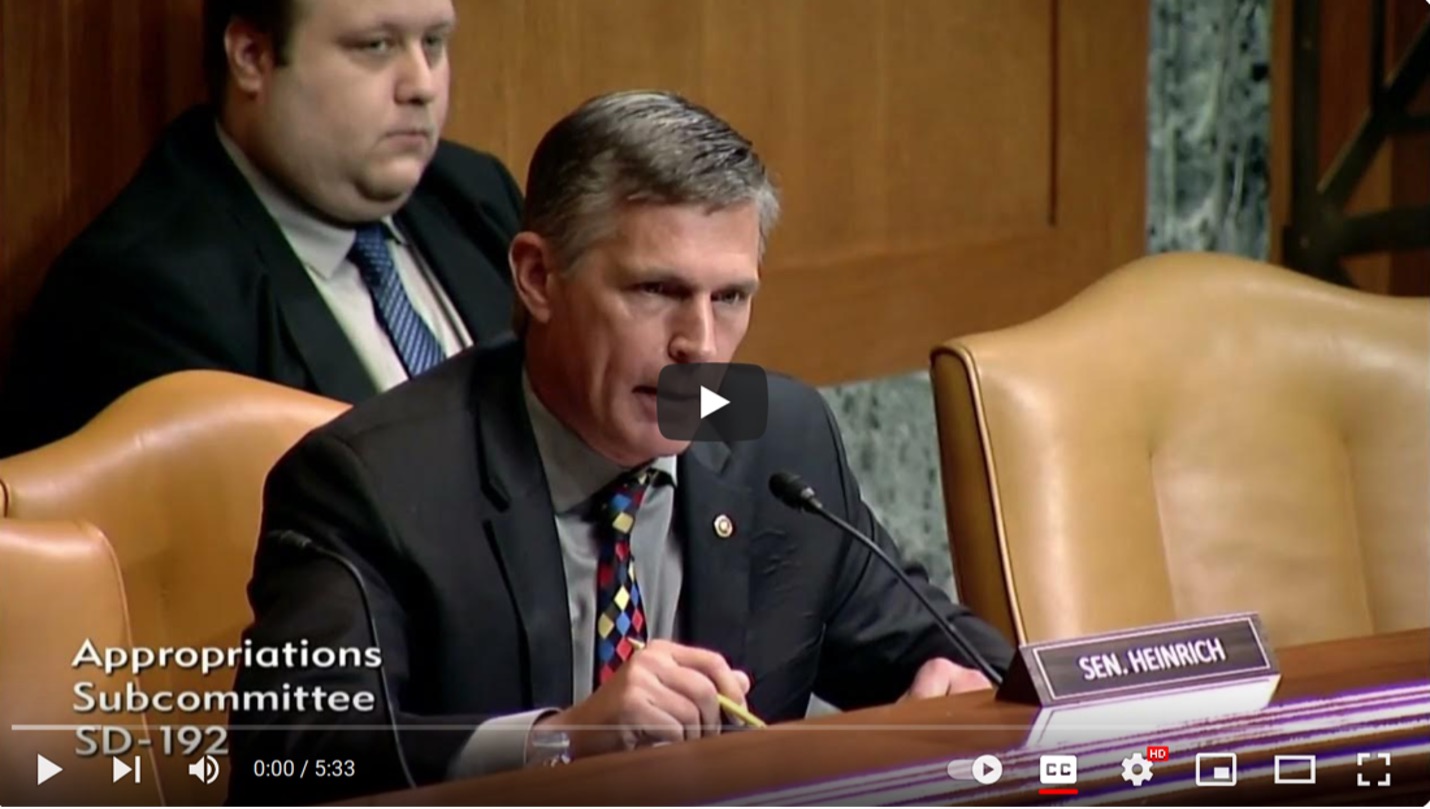VIDEO: Heinrich Asks Commerce Secretary About Manufacturing in Rio Rancho, Rural Business Center in Las Vegas, and National Labs Work on Artificial Intelligence
WASHINGTON – This week, during a hearing to review the Fiscal Year 2025 (FY25) Budget Request for the U.S. Department of Commerce, U.S. Senator Martin Heinrich (D-N.M.) asked Commerce Secretary Gina Raimondo about how the CHIPS and Science Act is revitalizing American semiconductor manufacturing, including at Intel’s facility in Rio Rancho, N.M.; the opening of a new Minority Business Development Rural Center in Las Vegas, N.M.; and the importance of Commerce collaborating on artificial intelligence with Department of Energy National Labs like Sandia and Los Alamos.
VIDEO: U.S. Senator Martin Heinrich questions Commerce Secretary Gina Raimondo, May 15, 2024.
On Semiconductor Manufacturing and Packaging at American Factories Like Intel’s Rio Rancho Facility:
Heinrich highlighted the success of the CHIPS and Science Act, legislation he championed, that has helped fuel a major reinvestment in American semiconductor manufacturing, including at Intel’s Rio Rancho, N.M. facility.
Heinrich said, “Secretary, as you know probably more than most, the CHIPS and Science Act has had just an incredible impact on semiconductor manufacturing in this country. At the Intel facilities in Rio Rancho, they are reinvesting to the tune of 700 permanent manufacturing jobs and literally thousands of skilled trades jobs while they build it out.”
He asked Secretary Raimondo, “All of us care about jobs, but talk a little bit also about why these new advanced packaging facilities are so important to restoring America’s leadership in making chips here at home and controlling our own supply chain.”
Secretary Raimondo responded, “Exactly for the reason you said. I mean, it is quite shocking, if you think about it, that in the past few decades, the United States has gone from being the leader in semiconductor manufacturing to now being 100% dependent on Korea and Taiwan for our leading-edge chips. Ninety-two percent of our leading-edge chips come from one company in Taiwan. That puts us in an unbelievably vulnerable position.
She continued, “So, as you say, it’s exciting news that we’re creating these jobs—and its thousands of them, and they’re good jobs, and high-paying and union jobs, and it’s great. This is fundamentally a national security issue. And you mentioned packaging. We also don’t have advanced packaging in the United States. So a disturbingly high number of chips that are in the U.S. military applications are shipped to, made somewhere, and then shipped to China or Asia to be packaged. So if we want to bolster our national security, we need to make and package these chips in the United States.”
On the New Rural Business Center in Las Vegas, N.M.:
Heinrich also highlighted the recent announcement that the Commerce Department’s Minority Business Development Agency (MBDA) has funded a new rural business center in Las Vegas, N.M., in addition to a new Las Cruces Center that was funded by $200,000 secured by Heinrich and U.S. Senator Ben Ray Luján.
Heinrich asked, “Giving businesses in rural communities the support they need is a real priority for my office. And so I was really pleased to see a new Minority Business Development Rural Center announced for Las Vegas, New Mexico. Talk to the committee a little bit about what these new rural centers will be bringing to the table for our rural businesses.”
Secretary Raimondo responded, “This is a pilot program that we started at MBDA because we know that rural businesses face a different set of challenges than, as you know very well, non-rural businesses. Harder to access capital, harder to find resources. So we started a pilot with rural business centers, including one in your state. It’s been very successful. The Budget Request asked for $3 million so we can do more.”
She continued, “It’s just a matter of meeting people where they are and teaching them how to get capital, how to hire, how to train employees, how to export. Fundamentally, my job is to make sure America outcompetes the rest of the world. And that means every American business has to be able to compete, minority-owned businesses, rural businesses.”
On the National Labs’ Artificial Intelligence Collaboration:
Heinrich, co-chair and co-founder of the Senate Artificial Intelligence (AI) Caucus, also highlighted the roadmap for artificial intelligence policy that he released this week alongside the Bipartisan AI Working Group with Senate Majority Leader Chuck Schumer (D-N.Y.), Todd Young (R-Ind.), and Mike Rounds (R-S.D.).
He pointed to the important role that the Commerce Department’s National Institute of Standards and Technology (NIST) will play and the need to leverage partnerships with other federal agencies, including experts at Los Alamos and Sandia National Laboratories in New Mexico.
Heinrich asked, “A number of us announced a new AI Roadmap today, and NIST is a big part of that. The Safety Institute at NIST, in particular: How do we make sure that the AI Safety Institute at NIST is also leveraging the capacity that exists in other parts of the federal government? For me, that would mean things like the expertise at the Los Alamos and Sandia National Labs. That’s a critical piece of it.”
Secretary Raimondo responded, “So we have a very close working relationship with the Department of Energy, who has some of the best AI experts in the federal government, and who has the compute. So, one of the things we’re going to be doing, for example, is testing and evaluating the frontier models before they go out into the world. We will need to work with the National Labs. And they’ve been incredibly collaborative in order to do that – setting the standards, tapping into their expertise, and, quite frankly, benefiting from their compute to run some of these models.”
Heinrich followed up, “I think these next couple of years are going to be really important for us getting the infrastructure in place to be able to manage this transition effectively.”
###
